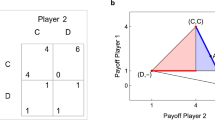Abstract
Subjects play a 5-person Prisoner's Dilemma both from an impartial point of view and in a regular fashion to determine whether 1) Concerns for fairness increase cooperative behavior; 2) Play of a Prisoner's Dilemma from an impartial point of view results in significantly higher levels of cooperation than does normal play; 3) Concern for fairness has greater explanatory force in explaining cooperation in impartial plays of the Prisoner's Dilemma than in normal plays; and 4) Experience with impartial play of a Prisoner's Dilemma sensitizes subjects to normative imperatives and results in higher levels of cooperation in subsequent normal plays of Prisoner's Dilemmas. The first and second hypotheses are supported, the third is inverted, and the fourth is not supported. Concern for fairness is demonstrated to play a complex role in explaining cooperative behavior in regular plays of the game.
An earlier version was presented at the Annual meetings of the Public Choice Society, 1993 Monteleone Hotel, New Orleans; 20 March 1993.
Similar content being viewed by others
References
Dawes, R. (1980). Social dilemmas. Annual Review of Psychology 31: 169–193.
Frohlich, N. (1992). An impartial reasoning solution to the Prisoner's Dilemma. Public Choice 74 (4): 447–460.
Frohlich, N., Hunt, T., Oppenheimer, J.A., and Wagner, R.H. (1975). Individual contributions to collective goods: Alternative models. Journal of Conflict Resolution 19 (March): 310–329.
Frohlich, N. and Oppenheimer, J.A. (1992). Choosing justice: An experimental approach to ethical theory. Berkeley, CA: University of California Press.
Hardin, G. (1968). The tragedy of the Commons. Science 162 (13 December): 1243–1262.
Hardin, R. (1971). Collective action as an agreeable n-Prisoner's Dilemma. Behavioral Science 16 (September–October): 472–481.
Hoffman, E. and Spitzer, M.L. (1985). Entitlements, rights, and fairness: An experimental examination of subjects' concepts of distributive justice. Journal of Legal Studies 14 (June): 259–297.
Isaac, R.M., McCue, K.F., and Plott, C.R. (1985). Public goods provision in an experimental environment. Journal of Public Economics 26: 51–74.
Kreps, D.M., Milgrom, P., Roberts, J., and Wilson, R. (1982). Rational cooperation in the finitely repeated Prisoner's Dilemma. Journal of Economic Theory 27: 245–252.
Liebrand, W.B., Messick, D.M., and Wolters, F.J. (1986). Why we are fairer than others: A cross-cultural replication and extension. Journal of Experimental and Social Psychology 22 (November): 590–604.
Liebrand, W.B., Messick, D.M., and Wilke, H.A.M. (Eds.). (1992). Social Dilemmas. New York: Pergamon Press.
Messick, D.M. and Brewer, M.B. (1983). Solving social dilemmas: A review. Psychological Review Papers: 11–44.
Miller, G.J. and Oppenheimer, J.A. (1982). Universalism in experimental committees. American Political Science Review 76 (June): 561–574.
Oppenheimer, J.A., Winer, M., and Lu, H. (1987). C & C, conflict and cooperation: An authoring system for simulations. PDS Software, Chevy Chase, Md.
Rawls, J. (1971). A theory of justice. Cambridge: Harvard University Press.
Roth, A.E. (1988). Laboratory experimentation in economics: a methodological overview. The Economic Journal 78 (December): 974–1031.
Saijo, T. and Yamaguchi, T. (1992). The spite dilemma in voluntary contribution mechanism experiments. Paper presented at the Public Choice Meetings, New Orleans, March.
Schelling, T. (1975). Hockey helmets, concealed weapons and daylight savings time. Journal of Conflict Resolution 17 (September): 381–428.
Author information
Authors and Affiliations
Additional information
We would like to thank the Social Sciences and Humanities Research Council of Canada for supporting this work. We also owe thanks to Avery Cook for his help in running the experiments, and David Manry and Stergios Skaperdikas for comments on an early draft of this paper.
Rights and permissions
About this article
Cite this article
Frohlich, N., Oppenheimer, J.A. Experiencing impartiality to invoke fairness in the n-PD: Some experimental results. Public Choice 86, 117–135 (1996). https://doi.org/10.1007/BF00114878
Accepted:
Issue Date:
DOI: https://doi.org/10.1007/BF00114878




